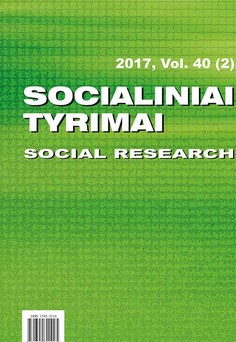Poreikio realizuoti savo gebėjimus dirbant dėl kitų raiška Akmenės rajono seniūnijose
Manifestation of the Need to Realize One’s Abilities Working for the Sake of Others in Akmenė District Elderships
Author(s): Laima Liukinevičienė, Rasa StatkuvienėSubject(s): Public Administration, Psychology of Self, Organizational Psychology, Behaviorism, Management and complex organizations, Human Resources in Economy
Published by: Vilniaus Universiteto Leidykla
Summary/Abstract: The works of Lithuanian scientists who have been analyzing human resource management issues in the context of public administration during the last decade show that human resource management processes in public sector institutions lack integrity with the strategic management of the entire organization, and that municipalities lack the experience in creating influential employee motivation systems as well as the experience in choosing the employees who have not only high professional competencies, but are also motivated to work selflessly for the sake of others. This is particularly relevant today as the decentralization of management is increasing (there are more than 3000 elderships and over 800 rural communities in Lithuania), and more and more functions are being transferred to municipalities. A part of the challenges facing the management sector has to be taken over by the elderships that possess a limited budget and a small number of employees (usually, there are up to 10 employees: 1–2 civil servants and the rest are contract staff). In these administrative structures, the inner motivation of employees and the inner need to implement their own skills working for the sake of the community and society in general, i.e. the self-transcendence (according to the English terminology), often facilitate to attain the goals of the organization creatively, innovatively, and with a great responsibility. Having penetrated into the theoretical conception of self-transcendence as the concept of motivation and the inner needs of an employee, and following the actualization of this phenomenon in the state service in order to validate the empirical analysis of the selftranscendence practice and significance in the eldership as well as to ground the construction of research instruments, the following theoretical perspectives were chosen: the integration of theory of needs with other theories of self-expression, by Maslow, and self-transcendence as the actualization of an individual’s self-realization top need in the context of the state service, according to Vanagas and Rakšnis, 2014; the concept of a leader as a Self-Leading Leader, by Henry J. Venter, 2012; the need for self-realization in the public service, according to J. Palidauskaitė, 2008; community-level leadership as the essential condition for the functioning of local selfgovernance, by Urvikis, 2016, and others. Analysis of the theoretical sources testifies that there is still a lack of scientific works analyzing self-transcendence not only as an individual’s need to work selflessly for the sake of others, realizing his / her abilities, and thus improving oneself, but also as a desirable organizational quality of a public sector bringing the employees’ aspirations closer to the mission of the organization (in order to meet public expectations).
Journal: Socialiniai tyrimai
- Issue Year: 40/2017
- Issue No: 2
- Page Range: 20-33
- Page Count: 14
- Language: Lithuanian

